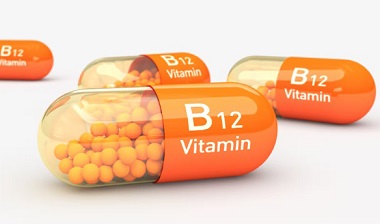COVID-19 Supplements: Study Shows That Vitamin B12 Is A Potent Antiviral Against SARS-CoV-2, MERS-CoV and HCoV-229E
Nikhil Prasad Fact checked by:Thailand Medical News Team Nov 26, 2023 1 year, 4 months, 4 days, 18 hours, 19 minutes ago
COVID-19 Supplements: In the relentless battle against viral infections, particularly the formidable SARS-CoV-2 responsible for the COVID-19 pandemic, scientists are exploring unconventional avenues to identify potent antiviral agents. Recent research conducted by the Center of Scientific Excellence for Influenza Viruses in Egypt, in collaboration with Cairo University, the National Research Centre in Egypt, St. Jude Children’s Research Hospital in Memphis, USA, and Human Link in Dubai, United Arab Emirates, has shed light on the remarkable antiviral properties of Vitamin B12. This
COVID-19 Supplements study, combining in silico and in vitro investigations, delves into the intricate details of Vitamin B12's potential as an effective defense against not only SARS-CoV-2 but also other coronaviruses, including MERS-CoV and HCoV-229E.

Thailand
Medical News had covered in the past, studies that also showed the merits of Vitamin B12 supplementation for COVID-19.
https://www.thailandmedical.news/news/covid-19-supplements-king-s-college-london-and-fujitsu-s-advanced-quadratic-computational-screening-identifies-vitamin-b12-as-a-potential-antiviral-ag
https://www.thailandmedical.news/news/covid-19-latest-sars-cov-2-may-target-red-marrow-and-prevent-formation-of-new-erythrocytes--vitamin-b12-supplementation-important
https://www.thailandmedical.news/news/supplements-singaporean-researchers-say-that-vitamin-d,-magnesium-and-vitamin-b12-combo-may-reduce-severity-in-older-covid-19-patients
Repurposing Vitamins for Antiviral Support
The strategy of repurposing vitamins as antiviral agents has gained momentum due to its rapid approach in controlling emerging viral infections. While there's substantial evidence supporting the use of vitamin supplementation in viral infections, the specific role of each vitamin in defending against coronaviruses has remained elusive. Vitamins, essential micronutrients, play pivotal roles in cellular metabolism and host immunity. They are broadly classified into fat-soluble (A, D2, D3, E) and water-soluble (B, C) groups. Notably, Vitamin D has been shown to regulate immune functions and exhibit antiviral activity against various viruses. Vitamins B1, C, D, and E are integral to the innate immune system during viral infections.
Vitamin B12, also known as cobalamin, is a water-soluble vitamin with crucial roles in metabolic processes, cardiovascular health, and immune system regulation. Despite the wealth of data supporting
vitamin supplementation in viral infections, the specific role of Vitamin B12 in anti-coronaviral defenses has remained unclear.
Investigating Antiviral Activities
The research team initiated a comprehensive investigation into the antiviral activities of available vitamins, focusing on SARS-CoV-2, MERS-CoV, and HCoV-229E. In silico studies, involving computational modeling, were combined with in vitro experiments to explore the inhibitory effects of various vitamins on viral infectivity and replication.
Results
Among the tested vitamins, Vitamin B12, in the forms of Hydroxocobalamin and Methylcobalamin, exhibited significant antiviral activity against all three coronaviruses. Cyanocobalamin, another form of Vitamin B12, selectively affected SARS-CoV-2. Methylcobalamin showed superior inhibition against SARS-CoV-2, Hydroxocobalamin against MERS-CoV, and Cyanocobalamin against HCoV-229E.
In silico studies further elucidated the potential binding affinities of Hydroxocobalamin, Methylcobalamin, and Cyanocobalamin to viral-specific cell receptors and proteins. These vitamins demonstrated significant binding affinity to receptors like ACE2, DPP4, and hAPN protein, as well as viral proteins including S-RBD, 3CL pro, and RdRp.
Mechanism of Action
The study explored the mode of action through cytotoxicity assays, qRT-PCR analysis, molecular docking, and plaque reduction assays. The results revealed a dose-dependent inhibition of viral replication and infectivity. Methylcobalamin displayed higher inhibition against SARS-CoV-2, Hydroxocobalamin against MERS-CoV, and Cyanocobalamin against HCoV-229E. Molecular docking studies illustrated the interactions of these vitamins with spike proteins, 3CL protease, cell receptors, and RdRP proteins of the three coronaviruses.
Analyzing the Binding Capacity through Docking
In-depth molecular docking analyses unveiled the intricate interactions between Vitamin B12 and viral proteins, specifically the spike proteins, 3CL protease, cell receptors, and RdRP proteins. Noteworthy hydrogen bond formations were identified, explaining the interference of Vitamin B12 with viral binding and entry mechanisms.
In Vitro Mechanism of Action
The study's in vitro investigations confirmed the direct antiviral activity of Vitamin B12 against SARS-CoV-2, MERS-CoV, and HCoV-229E. Three distinct modes of action were identified: neutralization through binding to spike RBD proteins, adsorption block by interfering with cell receptors, and interference with viral replication steps within infected cells by interacting with 3CL pro and RdRp polymerases.
Discussion
Vitamins are crucial for cell growth, function, and development, playing pivotal roles in immune responses. The study emphasized the potential of various B vitamins, particularly Vitamin B12, as antiviral agents against coronaviruses. Notably, Vitamin B12 is readily available, affordable, and globally accessible, making it a promising candidate for widespread use.
The findings align with existing literature highlighting the immunomodulatory properties of Vitamin B12, especially concerning CD8+ cells and the NK cell system. Moreover, Vitamin B12 has been utilized as a supplement against various viral infections, including hepatitis, HIV, and Norovirus. Its potential role in regulating NFκB levels, reducing inflammation, and alleviating COVID-19 symptoms adds another layer to its significance.
In silico screening results indicated significant binding affinities of Vitamin B12 to viral-specific cell receptors and proteins, providing a molecular understanding of its antiviral actions. The study emphasized the need for further in vivo investigations to determine optimal dosage, supplementation time, and potential combination with other vitamins.
Conclusion
The research unveiled the remarkable antiviral potential of Vitamin B12, particularly its forms Hydroxocobalamin, Methylcobalamin, and Cyanocobalamin, against SARS-CoV-2, MERS-CoV, and HCoV-229E. The multifaceted approach, combining computational modeling and in vitro experiments, provided a comprehensive understanding of the mechanisms underlying the antiviral activities. While Vitamin B12 emerges as a promising candidate for antiviral therapeutics, further studies are warranted to refine dosage recommendations, explore synergies with other vitamins, and establish its efficacy in real-world scenarios. The insights gained from this study pave the way for a new era of precision health and nutrition in the ongoing battle against viral diseases.
The study findings were published in the peer reviewed journal: Microorganisms.
https://www.mdpi.com/2076-2607/11/11/2777
For the latest on
COVID-19 Supplements, keep on logging to Thailand Medical News.
Check Out:
https://www.thailandmedical.news/articles/covid19-drugs
https://www.thailandmedical.news/articles/covid-19-herbs
https://www.thailandmedical.news/articles/covid-19-supplements
